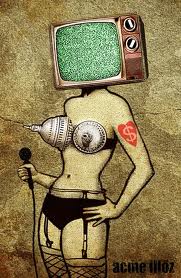Don’t be Fooled by Mainstream Media Journalists, “Independent” Experts and the CIA
By Global Research

Image: Anthony Freda
“Under CIA
manipulation, direction and, usually, their payroll, were past and
present presidents of Mexico, Colombia, Uruguay and Costa Rica, “our
minister of labor”, “our vice-president”, “my police”, journalists,
labor leaders, student leaders, diplomats, and many others. If the
Agency wished to disseminate anti-communist propaganda, cause dissension
in leftist ranks, or have Communist embassy personnel expelled, it need
only prepare some phony documents, present them to the appropriate
government ministers and journalists, and – presto! – instant scandal.” (William Blum, CIA Manipulation: The Painful Truths Told by Phil Agee, Anti-Empire Report 27 June 2013)
Independent media outlets are increasingly challenging the powers
that be and, thanks to social media, the truth about what is really
happening in our world can be shared at the click of a button.
Sadly, the imperial war machine continues to rear its violent head in
exponential proportion under the guise of democracy and “War on
Terrorism”.
This war machine is promoted by the mainstream media who cannot be
trusted for many reasons. It is a well documented fact that the CIA has
used journalism as a cover for its agents and has planted stories in the
media.
According to CIA documents, “more than 400 American journalists … in the past twenty‑five years have secretly carried out assignments for the Central Intelligence Agency“, wrote Carl Bernstein in 1977.
In this episode of Alternative views, former CIA agent John Stockwell explains “how CIA ‘disinformation’ tactics manipulate public opinion by planting stories in the press and by financing and supporting right-wing newspapers“.
Planting stories in the media is a standard CIA technique:
A common Agency tactic was writing editorials and phony news stories to be knowingly published by Latin American media with no indication of the CIA authorship or CIA payment to the media.
The propaganda value of such a “news” item might be multiplied by being
picked up by other CIA stations in Latin America who would disseminate
it through a CIA-owned news agency or a CIA-owned radio station. Some of these stories made their way back to the United States to be read or heard by unknowing North Americans. (Blum, op. cit.)
Moreover several journalists are members of the very influential foreign policy think tank Council on Foreign Relations, which has among its corporate members:
1. Major financial institutions such as:
2. All the companies part of what is known as Big Oil:
3. Major defense and security contractors which largely rely on military sales (figures from SIPRI) and government subsidies, among others:
DynCorp International (70% of revenues from military sales in 2011)
Lockheed Martin Corporation (78% of revenues from military sales in 2011)
Northrop Grumman (81% of revenues from military sales in 2011)
Raytheon Company (90% of revenues from military sales in 2011)
Booz Allen Hamilton Inc. (99% of revenues from federal government)
In addition, mainstream media experts on foreign policy issues are
often linked to the military-industrial complex and are very often
presented as ”independent”.
During the public debate around the
question of whether to attack Syria, Stephen Hadley, former national
security adviser to George W. Bush, made a series of high-profile media
appearances. Hadley argued strenuously for military intervention in
appearances on CNN, MSNBC, Fox News, and Bloomberg TV, and authored a
Washington Post op-ed headlined “To stop Iran, Obama must enforce red lines with Assad.”
In each case, Hadley’s audience was not
informed that he serves as a director of Raytheon, the weapons
manufacturer that makes the Tomahawk cruise missiles that were widely
cited as a weapon of choice in a potential strike against Syria. Hadley
earns $128,500 in annual cash compensation from the company and chairs
its public affairs committee. He also owns 11,477 shares of Raytheon
stock, which traded at all-time highs during the Syria debate ($77.65 on
August 23, making Hadley’s share’s worth $891,189). Despite this
financial stake, Hadley was presented to his audience as an experienced,
independent national security expert. (Public Accountability, War or No War on Syria: Conflict of Interest of “Experts” who Commented in Favor of Military Intervention, October 15, 2013)

No hay comentarios:
Publicar un comentario